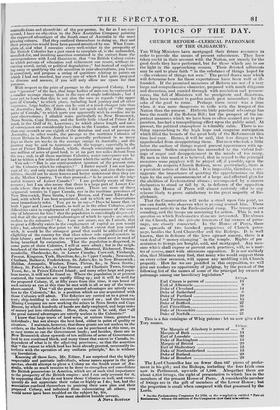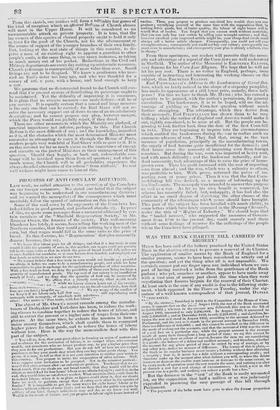TOPICS OF THE DAY.
CHURCH REFORM—CLERICAL PATRONAGE OF THE OLIGARCHY.
Tux Whig Ministers have mortgaged their future resources in order to provide the means of present subsistence. They have taken credit in their account with the Nation, not merely for the good deeds they have performed, but for those which are to see the light in the approaching session. Their devoted adherents may be said to place faith " in the substance of things hoped for —the evidence of things not seen." The period draws near which will determine how far these expectations have been well or ill- founded. If the promised measures of Reform are not it a very large and comprehensive character, prepared with much diligence and discretion, and carried through with resolution and perseve- rance, the fall of Ministers will be precipitate and disastrous. Men have been content to pardon much past misconduct for the sake of the good to come. Perhaps there never was a time when it was more dangerous to trifle with the temper of the Nation than the present. Hitherto little practical advantage has been the result of the Reform Bill ; but the prospect of the im- portant measures which we have been so often assured are in pre- paration, has had a tranquillizing effect upon the public mind. At present, the political atmosphere is tolerably calm. There is no- thing approaching to the high hope and sanguine anticipation which filled the breasts of the great body of the Reformersat this time last year. Hence, it will be said, that less danger is to be apprehended front disappointing them. But men who look a little below the surface of things regard present appearances with ap- prehensiom Sullen suspicion has succeeded to the violent feel- ings of anger and disappointment in the minds of too ninny. By men in this mood it is believed, that in regard to the principal measures some jugglery will be played off, if possible, upon the people. As respects Church Reform, more particularly, there is a prevalent notion of this kind. It is impossible, therciore, to ex- aggerate the importance of quieting the apprehensions on this topic by the early announcement of a large and effectual plan for the abolition of Ecclesiastical abuses ; accompanied by a sincere declaration to stand or fall by it, in defiance of the opposition which the House of Peers will almost certainly offer to any scheme likely to prove satisfactory to the great majority of En- glishmen.
That the Conservatives will make a stand upon this point, no one can doubt, who observes what is passing around hint. There is unusual -activity in the Ecclesiastical (mum. The trumpets are sounding, and the troops are mustering for action. This is not a question on which Ecclesiastics alone are interested. The abuses of the Church, and the private interests of lay owners of patro- nage, are closely connected. In the house of Peers, there are upwards of two hundred proprietors of Church patro- nage, besides the Lord Chancellor and the Bishops. It is well known, that in defiance of the laws against simony, there is a vast deal of " money-changing" in the temple. Rights of pre sentation to livings are bought, sold, and mortgaged. Any mea- sure which shall expose or prevent such practices, will, as a mat- ter of course, meet with strenuous opposition. It is not unlikely also, that Ministers may find, that many who would support them on every other occasion, will oppose any meddling with Church property. How fur we are justified in this supposition, we will give our readers an opportunity of judging, by the perusal of the following list of the names of some of the principal lay owners of patronage among our hereditary legislators.*
Livings.
Earl Craven is patron of 13 Earl of Albemarle 9 Duke of Cleveland 14 Duke of Sutherland 8 Duke of Portland . 10 Lord Yarborough 1.5 Duke of Bedford 27 Earl Fitzwilliam 31 Duke of Devonshire 48 Duke of Norfolk 21
This is a fair catalogue of Whig patrons : let us now give a few Tory names.
The Marquis of Ailesbury is patron of Marquis of Bath 13
Earl of Lonsdale 32
Duke of Buckingham 13 Marquis of Bristol 29 Earl of Shaftesbury 12 Duke of Northumberland 13 Duke of Rutland 29
Duke of Beaufort 29 The Lord Chancellor has no fewer than 807 pieces of prefer- ment in his gift; and the Bishops, including the four Irish ones now in Parliament, upwards of 1,900. Altogether there are about 4,050 livings, the right of presentation to which lies in the members of the present House of Peers. A considerable number of livings are in the gift of members of the Lower House ; but the proportion is small when compared with that possessed by the Lords.
• Seethe Parliamentary Compaaion fir Int or the ermpilatien entitte,1 " Penni geoleeiarum," whence the authors of rho Companion draw task information. 'Kum this sketch, our readers a ill form a tohn-ably fair guess of the kind of reception which an dictent Reform of Church abuses will meet in the Upper House. It will be considered as an unwarrantable attack on private property. It is true, that the lay owners of this species of clerical property ought to hold it only in trust for the good of the Church, not for the advancement or the means of support of the younger branches of their own family. But, looking at the real state of things in this country, to de- prive a man of an existing right to appoint a guardian to other people's souls, is the same thing, in very many installee3, as taking so much money out of his pocket. Reductions in the Civil and Military departments are every day cutting up aristocratic resources. Church patronage is consequently of more value than ever. Small livings are not to be despised. We know a gentleman who mar- ried an Earl's sister not long ago, and who was thankful for a curacy of 401. a year, with a house, and land enough to keep a cow.
We presume that no disinterested friend to the Church will con- tend that Vie present system of distributing its patronage ought to be maintained. Yet the difficulty of improving it is enormous. It is plain that no evasive measure—no make-believe—will be of any service. It is equally certain that a sound and large measure is the only one that can be carried : for Earl GREY will not re- ceive the necessary support out of doors to one of an unsatisfactory description; and he cannot propose any plan, however meagre, which tile Peers would not joyfully reject, if they dared.
There are other measures to which the Ministry are pledued, of practical importance not inferior, perhaps, to this. But Church Reform is the most difficult of any ; and the knowledge, imperfect as it is, of the obstacles which the most determined Minister must encounter in attempting to carry it through the House of Peers, renders people very watchful of Earl GREY with respect to it. It is on this account we lay so much stress on the importance of energy and sincerity on the partof Ministers in their management of this question. Should they boggle, or back out, iedescribable con- tempt will be lavished upon them from all quarters; and what is
much worse, the Church will in all probability experience the always dreaded alternative of the reform " from without.- Its real well wishers might have cause to lament this.















 Previous page
Previous page